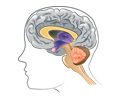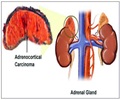Scientists develop ways to quantify stress levels objectively.

Our adrenal glands make cortisol (a steroid hormone) out of cholesterol. The adrenocorticotropic hormone (ACTH), produced by the pituitary gland, controls the secretion of cortisol.
It is responsible for carrying out vital functions in our bodies, like regulation of metabolism, blood sugar levels, and blood pressure. It also affects our cardiovascular functions and immune system.
However, cortisol's main function is to direct the required energy to our brain, muscles, and heart during fight-or-flight moments.
"Cortisol can be secreted on impulse - you feel fine, and suddenly something happens that puts you under stress, and your body starts producing more of the hormone," says Adrian Ionescu, head of Nanolab.
Ionescu explains that in people who suffer from stress-related diseases, the circadian rhythm is completely thrown off, resulting in the body making too much or not enough cortisol. This can seriously damage an individual's health, potentially leading to obesity, cardiovascular disease, depression, or burnout.
The patch consists of a transistor, an electrode made from graphene, and aptamers. The aptamer in the patch carries a negative charge, and when it comes into contact with cortisol, the strands of the aptamer fold onto themselves and bring the charge closer to the electrode surface. The device then detects the charge and can measure the cortisol concentration in the wearer’s sweat.
Cortisol levels can also be measured through blood, saliva, urine, and sweat. However, Ionescu and the team’s device uses sweat to measure and continuously monitor cortisol concentrations throughout the circadian cycle.
Ionescu explains that because the device can be worn, scientists can collect quantitative, objective data on certain stress-related diseases in a non-invasive, precise, and instantaneous manner over the full range of cortisol concentrations in human sweat.
The device needs to undergo clinical trials on humans that will involve healthy individuals and people suffering from Cushing's syndrome (when the body produces too much cortisol), Addison's disease (when the body doesn't produce enough), and stress-related obesity.
Source-Medindia












